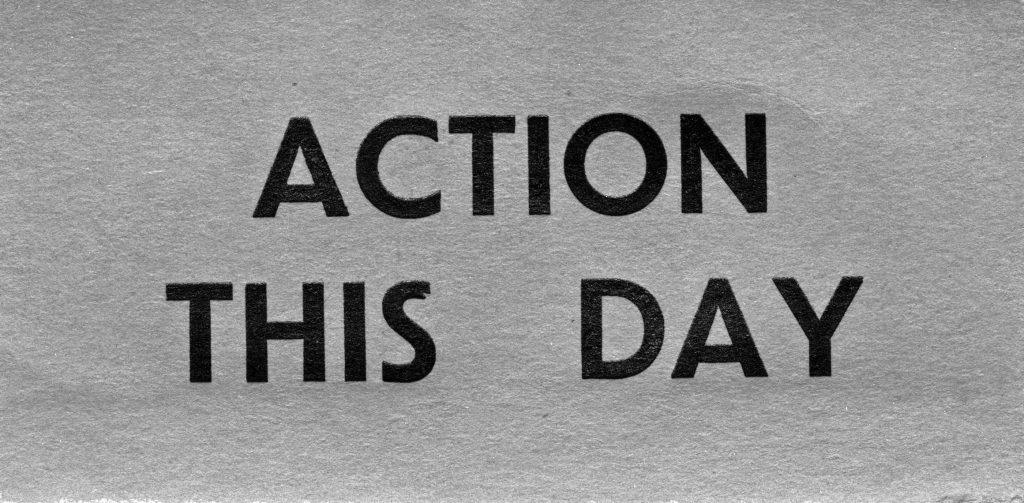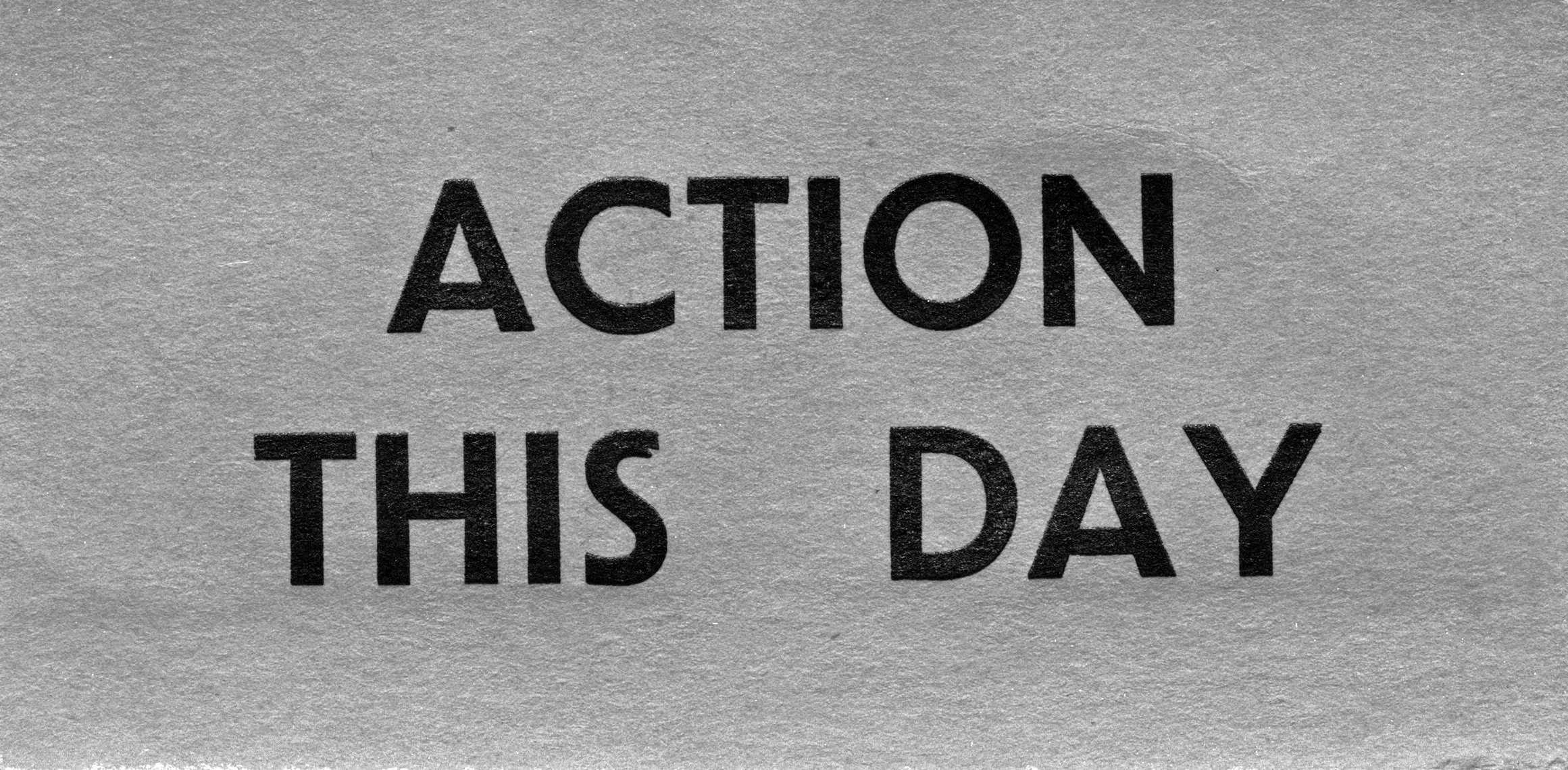
Finest Hour 173
Action This Day Summer 1891, Summer 1916, Spring 1941

August 14, 2016
Finest Hour 173, Summer 2016
Page 36
By Michael McMenamin

125 Years ago
Summer 1891 • Age 16
“A Head for My Room”
Lord Randolph was still in South Africa on business during the summer when he received Winston’s letter recounting, among other things, the abandoned factory windows he and some other Harrow students had broken. In his reply to Winston on 27 June, Lord Randolph made no reference to the broken windows. Rather, in distinct contrast to many of his critical letters to his son, he began this one in a cheery upbeat manner:
You cannot think how pleased I was to get your interesting & well-written letter & to learn that you are getting on well. I understand that Mr Welldon thinks you will be able to pass your examination into the Army when the time comes. I hope it may be so, as it will be a tremendous pull for you ultimately.

2024 International Churchill Conference
He concluded the letter with “Ever yr most affte father” and added a p.s. that he was “doubtful about being able to bring home a tame antelope.” In a letter to his father on 22 July, Winston clarified what he wanted: “I never meant you to bring home a ‘live’ antelope. What I meant was a head for my room.”
While Winston’s father was in South Africa, he persuaded his mother’s long-time lover Count Kinsky to take him to the Crystal Palace, where an exhibition was being put on for the German Emperor. It was apparent from his letter to his brother that Winston was quite impressed by Kinsky. A Fire Brigade drill past the Emperor was followed by dinner. “The head man said that he could not possibly give us a table,” Winston wrote, “but Count K. spoke German to him & it had a wonderful effect. Very tolerable dinner. Lots of champagne which pleased your loving brother very much.”
100 Years ago
Summer 1916 • Age 41
“A Sitting Target”
Having taken the fig leaf offered by General Douglas Haig that he “could do so much more for the war effort by returning to Parliament and using his energy and skill to get conscription through the House,” Churchill did so in early May. Promptly upon arriving, he joined the debate on conscription. Prime Minister Asquith had proposed excluding Ireland from conscription in the wake of the Easter Rising in the previous month. The Unionist leader Sir Edward Carson and other Tories opposed the exclusion, and Churchill supported Carson. Churchill was a strong supporter of conscription, but if his support for Carson was an effort to curry favor with the Tories and ease their opposition to his once more holding a cabinet office, it failed. The Tories would not soon forget Churchill’s pre-war role as the Liberal Party’s chief spokesman for Irish Home Rule and the cutting, sarcastic attacks and accusations of treason he had lodged against them in the House.
Roy Jenkins wrote that Churchill nevertheless “went on speaking relentlessly” in the House. “Any debate which had anything to do with the general conduct of the war called forth a Churchill oration—and they were none of them short. They contained very good passages, showing that he had in no way lost his capacity to shine an original light on to an argument and to express it with eloquence.” Two of the issues on which he felt the strongest were (1) his opposition to any more futile offensives where the British did not have “a real, substantial preponderance of strength,” and (2) the distinction between the “trench population” who were sent back to the front after being wounded and those who never went anywhere near the front line, yet lived in almost complete safety receiving higher pay and more decorations. It was, Churchill said, “one of the grimmest class distinctions ever drawn in the world.”
Nonetheless, Jenkins believed Churchill did himself more political harm than good by his speeches in the House during May and wrote that there were three reasons for this. First, he spoke too often and this reduced his effect. Next, “feeling vulnerable,” he was too keen to defend “every bit of his own record.” Finally, he was “too easy a sitting target” for those who wished to dismiss him with ad hominem attacks rather than answer Churchill’s arguments.
In early June, the Secretary of War, Lord Kitchener, drowned on his way to Russia when his ship struck a mine and went down with all hands. This affected Churchill negatively in two major ways. He and Sir Ian Hamilton were preparing evidence for the Royal Commission on the Dardanelles and, as Martin Gilbert writes, “were poring over Kitchener’s telegrams to Hamilton to ensure that no important document would be omitted with regard to Kitchener’s hesitations, changes of mind, and neglect of the Army once it was ashore.”
In short, they were going to place the major share of the blame for the failed campaign at Kitchener’s door and, in his defense, let him explain what he was doing with the Army at Gallipoli. Now, he would not be doing so. As Hamilton wrote bitterly, “the fact that he should have vanished at the very moment Winston and I were making an unanswerable case against him was one of those coups with which his career was crowded—he was not going to answer.” Kitchener’s death also meant that Britain would need a new Secretary of War, but Asquith was in no hurry to fill that position, assuming those duties himself for more than a month. When Lloyd George was appointed to the position on 7 July, Churchill briefly hoped he might takeover from the Welsh Wizard as Minister of Munitions. During this interim when Asquith was doing double duty, Haig prepared for and launched a new frontal offensive on the Somme, precisely the type of “futile offensive” Churchill had been arguing against.
75 Years ago
Spring 1941 • Age 66
“We Have but One Aim”
On 10 May, the anniversary of Churchill becoming Prime Minister, insult was added to injury when the heaviest German air raid of 1941 destroyed the House of Commons. On 10 June, with summer approaching, Churchill received good news from Bletchley indicating Hitler was about to bite off more than he could chew: top secret German radio signals had been decoded giving the exact disposition of a large number of German Army units deployed all along the Soviet border. Even though Churchill promptly sent this information to Stalin the next day, the Red Army was still surprised on 22 June when German troops invaded the Soviet Union along a thousand-mile front.
Churchill addressed the nation in a broadcast the night of the invasion. “No one has been a more consistent opponent of Communism for the past twenty-five years. I will unsay no word that I have spoken about it. But this all fades away before the spectacle that is now unfolding. The past, with its crimes, its follies, and its tragedies flashes away….We have but one aim and one single irrevocable purpose. We are resolved to destroy Hitler and every vestige of the Nazi regime. From this, nothing will turn us—nothing…. Any man or state who fights against Nazidom will have our aid. Any man or state who marches with Hitler is our foe.”
Churchill was concerned that Russia might be inclined to conclude a separate peace with Germany and told Stalin in a telegram on 7 July that he had increased the strength of RAF bombing runs against Germany from 200 to 250 aircraft that night. “This will go on,” he told Stalin in a telegram. “Thus we hope to force Hitler to bring some of his air power to the West and gradually take some of the strain off you…. We have only to go on fighting to beat the life out of these villains.” On 12 July, Stalin agreed to a mutual assistance pact with Britain where both parties agreed there would be no separate peace between either of them and Germany. While German bombing raids on Britain continued, the Royal Air Force did the same to Germany. In a speech on 14 July, Churchill said, “We will mete out to the Germans the measure, and more than the measure, they have meted out to us. You do your worst and we will do our best.”
In August, Churchill met Roosevelt at Placentia Bay in Newfoundland. While the “Atlantic Charter” declaration of democratic principles received the most publicity, there were a number of practical, immediate steps to which the United States agreed. The US would (1) give aid to Russia on a “gigantic scale” and coordinate that with Britain; (2) allocate even more ships to carry more bombers and tanks across the Atlantic for Britain; (3) provide a five-destroyer escort for every convoy to Britain; (4) deliver bombers to both Britain and West Africa, along with American pilots to provide training to British pilots; and (5) assume all naval patrol duties from North America to Iceland.
When he returned to England, Churchill told the War Cabinet that he had “established warm and deep personal relations” with President Roosevelt, who confided that all American warships accompanying convoys had been ordered to attack any German submarine that came within 300 miles of the convoy. FDR further “made it clear” to Churchill “that he would look for an ‘incident’ which would justify him in opening hostilities.”
Subscribe
WANT MORE?
Get the Churchill Bulletin delivered to your inbox once a month.


